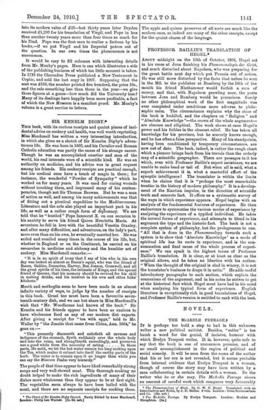PROFESSOR BAILLIE'S TRANSLATION OF HEGEL.*
AnouT midnight on the 13th of October, 1806, Hegel sat in his room at Jena finishing his Phenomenologie der Geist, and much disturbed about Napoleon, who was preparing for the great battle next day which put Prussia out of action. He was still more disturbed by the facts that unless he sent in the MS. to the publisher at Bamberg by the 18th of the month his friend Niethammer would forfeit a sum of money, and that, with Napoleon prowling near, the posts between Jena and Bamberg would be precarious. Surely no other philosophical work of the first magnitude was ever completed under conditions more adverse to philo- sophic calm. The circumstance explains why the close of the book is huddled, and the chapters on " Religion " and "Absolute Knowledge "—the crown of the whole argument—. are obscure and elliptical. The work shows at once Hegel's power and his foibles in the clearest relief. He has taken all knowledge for his province, but he scarcely knows enough, and he has often a false perspective. Many of his standpoints, having been conditioned by temporary circumstances, are now out of date. The book, indeed, is rather the rough chart which a pioneer brings back from his travels than the orderly map of a scientific geographer. There are passages in it too which, even with Professor Baillie's expert assistance, we are unable to make head or tail of. But when all is said, what a superb achievement it is, what a masterful effort of the synoptic intelligence 1 The translator is within the limits when he claims that it is " perhaps the most remarkable treatise in the history of modern philosophy." It is a develop- ment of the Kantian impulse, in the direction of scientific truth and concrete fact. It offers us a systematic survey of the ways in which experience appears. Hegel begins with an analysis of the fundamental features of experience. He then endeavours to systematise the various modes of experience by analysing the experience of a typified individual. He takes the normal forms of experience, and attempts to blend in his argument the type and the historic fact. The book is not a complete system of philosophy, but the prolegomena to one. "All that is done in the Phenomenology towards such a system is to show that 'Absolute Knowledge' as a mode of spiritual life has its roots in experience, and is the con- summation and final cause of the whole process of experi- ence." We can speak in the highest terms of Professor Baillie's translation. It is clear, or at least as clear as the original allows, and he takes no liberties with his author. " When the thought of the original is clad in wincey, it is not the translator's business to drape it in satin." He adds useful introductory paragraphs to each section, which explain the connexions of the argument, and in his notes he strives to get at the historical fact which Hegel must have had in his mind when analysing his typical form of experience. English literature is exceptionally rich in good translations of Hegel, and Professor Baillie's version is entitled to rank with the best.






































 Previous page
Previous page